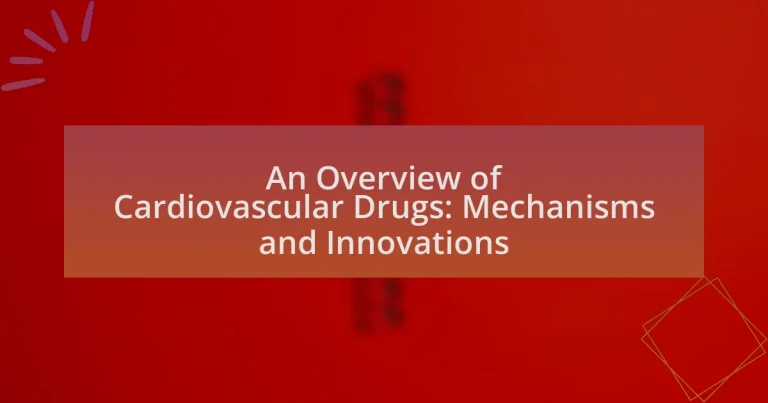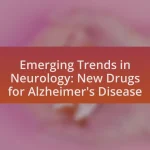Cardiovascular drugs are essential medications designed to treat heart and blood vessel conditions, encompassing various classes such as antihypertensives, anticoagulants, antiplatelet agents, and lipid-lowering medications. This article provides a comprehensive overview of how these drugs function in the body, their primary mechanisms of action, and their impact on cardiovascular health. It also explores the latest innovations in cardiovascular drug development, including advancements in technology and personalized medicine, while addressing the challenges faced in bringing new therapies to market. Additionally, the article highlights the importance of patient education and adherence to optimize treatment outcomes in managing cardiovascular diseases.
What are Cardiovascular Drugs?
Cardiovascular drugs are medications specifically designed to treat conditions related to the heart and blood vessels. These drugs include a variety of classes such as antihypertensives, anticoagulants, antiplatelet agents, and lipid-lowering medications, each targeting different aspects of cardiovascular health. For instance, antihypertensives lower blood pressure, while anticoagulants prevent blood clots, thereby reducing the risk of heart attacks and strokes. The effectiveness of these drugs is supported by extensive clinical research, demonstrating their role in improving patient outcomes in cardiovascular diseases.
How do Cardiovascular Drugs function in the body?
Cardiovascular drugs function in the body by targeting various physiological processes to regulate heart function and blood circulation. These medications can lower blood pressure, reduce heart rate, improve blood flow, and manage cholesterol levels. For instance, beta-blockers decrease heart rate and contractility, while ACE inhibitors relax blood vessels, leading to lower blood pressure. Statins work by inhibiting cholesterol synthesis in the liver, effectively reducing overall cholesterol levels in the bloodstream. The effectiveness of these drugs is supported by clinical studies demonstrating their ability to decrease the risk of heart attacks and strokes, thereby improving cardiovascular health.
What are the primary mechanisms of action for these drugs?
The primary mechanisms of action for cardiovascular drugs include modulation of heart rate, blood pressure regulation, and alteration of vascular tone. For instance, beta-blockers reduce heart rate and myocardial contractility by blocking beta-adrenergic receptors, which decreases cardiac output and oxygen demand. Calcium channel blockers inhibit calcium influx into cardiac and smooth muscle cells, leading to vasodilation and reduced blood pressure. Additionally, ACE inhibitors prevent the conversion of angiotensin I to angiotensin II, resulting in vasodilation and decreased blood volume. These mechanisms are critical in managing conditions such as hypertension, heart failure, and arrhythmias, demonstrating the diverse pharmacological strategies employed in cardiovascular therapy.
How do these mechanisms affect cardiovascular health?
Cardiovascular drugs operate through various mechanisms that significantly influence cardiovascular health by regulating blood pressure, heart rate, and vascular function. For instance, antihypertensive medications lower blood pressure, reducing the risk of heart attack and stroke, while beta-blockers decrease heart rate, improving heart efficiency and reducing workload. Statins, another class of cardiovascular drugs, lower cholesterol levels, which helps prevent atherosclerosis and subsequent cardiovascular events. Clinical studies have shown that effective management of these parameters through pharmacological interventions leads to improved outcomes in patients with cardiovascular diseases, as evidenced by reduced morbidity and mortality rates associated with controlled hypertension and cholesterol levels.
What types of Cardiovascular Drugs are available?
Cardiovascular drugs are categorized into several types, including antihypertensives, anticoagulants, antiplatelet agents, statins, beta-blockers, and diuretics. Antihypertensives are used to lower blood pressure, while anticoagulants prevent blood clots. Antiplatelet agents reduce the risk of heart attacks and strokes by preventing platelets from clumping together. Statins lower cholesterol levels, beta-blockers decrease heart rate and workload, and diuretics help eliminate excess fluid from the body. Each type plays a crucial role in managing cardiovascular diseases, supported by clinical guidelines and extensive research on their efficacy and safety.
What are the main classes of Cardiovascular Drugs?
The main classes of cardiovascular drugs include antihypertensives, anticoagulants, antiplatelet agents, statins, and diuretics. Antihypertensives are used to lower blood pressure and include categories such as ACE inhibitors, beta-blockers, and calcium channel blockers. Anticoagulants prevent blood clot formation, while antiplatelet agents inhibit platelet aggregation to reduce the risk of heart attacks and strokes. Statins are primarily used to lower cholesterol levels, and diuretics help reduce fluid overload in conditions like heart failure. These classes are essential in managing various cardiovascular diseases and improving patient outcomes.
How do these classes differ in their applications?
Cardiovascular drug classes differ in their applications primarily based on their mechanisms of action and the specific cardiovascular conditions they target. For instance, beta-blockers are primarily used to manage hypertension and heart failure by reducing heart rate and myocardial oxygen demand, while ACE inhibitors are utilized to treat hypertension and heart failure by inhibiting the angiotensin-converting enzyme, leading to vasodilation and reduced blood pressure. Additionally, statins are prescribed for hyperlipidemia to lower cholesterol levels and reduce the risk of cardiovascular events. Each class is tailored to address distinct pathophysiological processes, ensuring targeted therapeutic effects for various cardiovascular diseases.
Why are Cardiovascular Drugs important in modern medicine?
Cardiovascular drugs are crucial in modern medicine because they effectively manage and treat various cardiovascular diseases, which are leading causes of morbidity and mortality worldwide. These medications, including antihypertensives, anticoagulants, and statins, help control blood pressure, prevent blood clots, and lower cholesterol levels, thereby reducing the risk of heart attacks and strokes. For instance, according to the World Health Organization, cardiovascular diseases account for approximately 32% of all global deaths, highlighting the necessity of these drugs in improving patient outcomes and prolonging life.
What impact do they have on patient outcomes?
Cardiovascular drugs significantly improve patient outcomes by effectively managing heart conditions and reducing mortality rates. For instance, studies have shown that the use of beta-blockers after a heart attack can lower the risk of subsequent cardiac events by approximately 25%. Additionally, the implementation of statins has been linked to a 30% reduction in the risk of cardiovascular events in high-risk populations. These medications enhance quality of life by alleviating symptoms, preventing disease progression, and improving overall cardiovascular health.
How do they contribute to the management of cardiovascular diseases?
Cardiovascular drugs contribute to the management of cardiovascular diseases by targeting specific physiological mechanisms to improve heart function and reduce disease progression. For instance, antihypertensives lower blood pressure, thereby decreasing the risk of heart attack and stroke, while statins reduce cholesterol levels, which helps prevent atherosclerosis. Clinical studies have shown that the use of beta-blockers can significantly reduce mortality in patients with heart failure, demonstrating their effectiveness in managing this condition. Additionally, anticoagulants prevent blood clots, which is crucial in managing conditions like atrial fibrillation, where the risk of stroke is elevated. These drugs are essential components of treatment protocols, supported by extensive research and clinical guidelines that validate their roles in improving patient outcomes in cardiovascular health.
What Innovations are Shaping Cardiovascular Drug Development?
Innovations shaping cardiovascular drug development include the use of artificial intelligence (AI) for drug discovery, advanced biomarker identification, and personalized medicine approaches. AI accelerates the identification of potential drug candidates by analyzing vast datasets, leading to more efficient screening processes. Advanced biomarker identification enhances the ability to predict patient responses to therapies, allowing for tailored treatment plans. Personalized medicine approaches, such as pharmacogenomics, enable the customization of drug therapies based on individual genetic profiles, improving efficacy and reducing adverse effects. These innovations collectively enhance the precision and effectiveness of cardiovascular treatments, addressing the complexities of cardiovascular diseases.
How is technology influencing Cardiovascular Drug research?
Technology is significantly influencing cardiovascular drug research by enhancing drug discovery processes, improving patient stratification, and facilitating real-time data analysis. Advanced computational methods, such as artificial intelligence and machine learning, enable researchers to analyze vast datasets, identify potential drug candidates, and predict their efficacy and safety profiles more efficiently. For instance, AI algorithms can process genomic data to uncover biomarkers that help in selecting appropriate patient populations for clinical trials, thereby increasing the likelihood of successful outcomes. Additionally, technologies like high-throughput screening and in silico modeling allow for rapid testing of drug interactions and mechanisms, streamlining the development pipeline. These innovations collectively lead to more targeted therapies and improved patient outcomes in cardiovascular medicine.
What role do biomarkers play in drug development?
Biomarkers play a crucial role in drug development by serving as measurable indicators of biological processes, disease states, or responses to therapeutic interventions. They facilitate the identification of potential drug targets, enable patient stratification for clinical trials, and assist in monitoring drug efficacy and safety. For instance, in cardiovascular drug development, biomarkers like troponin levels are used to assess myocardial injury, guiding treatment decisions and improving patient outcomes. The use of biomarkers can streamline the drug development process, reduce costs, and enhance the likelihood of successful clinical trials by providing objective data that informs both preclinical and clinical phases.
How are artificial intelligence and machine learning utilized?
Artificial intelligence and machine learning are utilized in the field of cardiovascular drugs for drug discovery, patient risk assessment, and personalized medicine. These technologies analyze vast datasets to identify potential drug candidates, predict patient responses to treatments, and optimize therapeutic strategies. For instance, machine learning algorithms can process genomic data to uncover biomarkers that indicate how patients will respond to specific cardiovascular medications, enhancing treatment efficacy and safety. Studies have shown that AI-driven approaches can significantly reduce the time and cost associated with drug development, with some estimates suggesting a decrease of up to 30% in development timelines.
What recent advancements have been made in Cardiovascular Drugs?
Recent advancements in cardiovascular drugs include the development of novel anticoagulants, such as factor Xa inhibitors, which offer improved safety profiles and dosing convenience compared to traditional therapies. Additionally, the introduction of SGLT2 inhibitors has shown significant benefits in heart failure management, reducing hospitalization rates and improving outcomes in patients with reduced ejection fraction. Clinical trials, such as the EMPEROR-Reduced study, demonstrated that empagliflozin significantly lowers the risk of cardiovascular death and hospitalization for heart failure. These innovations reflect a shift towards more targeted therapies that enhance patient care in cardiovascular disease management.
What are the latest FDA-approved Cardiovascular Drugs?
The latest FDA-approved cardiovascular drugs include Inclisiran, a small interfering RNA that targets PCSK9 to lower LDL cholesterol, and Bempedoic acid, which inhibits ATP-citrate lyase to reduce cholesterol levels. Inclisiran was approved in December 2020, while Bempedoic acid received approval in February 2020. These approvals reflect ongoing innovations in cardiovascular treatment aimed at improving patient outcomes through novel mechanisms of action.
How do these innovations improve treatment efficacy?
Innovations in cardiovascular drugs improve treatment efficacy by enhancing drug delivery systems, optimizing pharmacokinetics, and personalizing therapy. For instance, advanced drug delivery methods, such as nanoparticles, allow for targeted release of medications, which increases the concentration of the drug at the site of action while minimizing systemic side effects. Additionally, innovations like biomarker-driven therapies enable healthcare providers to tailor treatments based on individual patient profiles, leading to more effective management of conditions such as hypertension and heart failure. Research has shown that personalized approaches can lead to a 30% improvement in treatment outcomes compared to standard therapies, demonstrating the significant impact of these innovations on patient care.
What challenges exist in the development of new Cardiovascular Drugs?
The development of new cardiovascular drugs faces several significant challenges, including high costs, lengthy clinical trial processes, and regulatory hurdles. High costs arise from extensive research and development requirements, with estimates suggesting that developing a new drug can exceed $2.6 billion. Lengthy clinical trials often take over a decade to complete, which delays the availability of new treatments. Additionally, regulatory hurdles, such as stringent approval processes by agencies like the FDA, can complicate and prolong the development timeline. These factors collectively hinder innovation and the timely introduction of effective cardiovascular therapies.
What regulatory hurdles must be overcome?
Regulatory hurdles that must be overcome in the development of cardiovascular drugs include stringent clinical trial requirements, safety and efficacy evaluations, and compliance with Good Manufacturing Practices (GMP). These regulations are enforced by agencies such as the U.S. Food and Drug Administration (FDA) and the European Medicines Agency (EMA), which mandate extensive preclinical and clinical testing to ensure that new drugs are both safe for human use and effective in treating cardiovascular conditions. For instance, the FDA requires a series of phased clinical trials, including Phase I for safety, Phase II for efficacy, and Phase III for large-scale testing, before granting approval. Failure to meet these regulatory standards can result in delays or denial of drug approval, impacting the availability of innovative cardiovascular treatments.
How do financial constraints affect research and development?
Financial constraints significantly limit research and development by reducing available funding for innovative projects. When financial resources are scarce, organizations may prioritize short-term gains over long-term research initiatives, leading to fewer breakthroughs in areas such as cardiovascular drugs. For instance, a study published in the Journal of Health Economics found that pharmaceutical companies with tighter budgets often cut R&D spending by up to 20%, which directly correlates with a decrease in new drug approvals. This financial pressure can stifle creativity and slow the pace of innovation, ultimately affecting the development of effective treatments for cardiovascular diseases.
How do Cardiovascular Drugs impact patient care?
Cardiovascular drugs significantly enhance patient care by effectively managing heart-related conditions, thereby improving patient outcomes. These medications, including antihypertensives, anticoagulants, and statins, lower blood pressure, prevent blood clots, and reduce cholesterol levels, respectively. For instance, studies show that the use of statins can reduce the risk of heart attacks by up to 30% in high-risk patients. Furthermore, timely administration of these drugs can lead to decreased hospitalizations and improved quality of life for patients with chronic cardiovascular diseases.
What are the common side effects of Cardiovascular Drugs?
Common side effects of cardiovascular drugs include dizziness, fatigue, nausea, and hypotension. These side effects arise due to the pharmacological actions of these medications, which often aim to lower blood pressure, regulate heart rate, or manage cholesterol levels. For instance, beta-blockers can cause fatigue and dizziness as they reduce heart rate and cardiac output. Additionally, diuretics may lead to electrolyte imbalances, resulting in symptoms like dizziness and muscle cramps. According to a study published in the Journal of the American College of Cardiology, approximately 30% of patients experience some form of side effect when taking cardiovascular medications, highlighting the prevalence of these adverse reactions.
How can patients manage these side effects effectively?
Patients can manage side effects of cardiovascular drugs effectively by adhering to prescribed medication regimens, maintaining open communication with healthcare providers, and implementing lifestyle modifications. Adhering to medication schedules ensures consistent therapeutic levels, while discussing any adverse effects with healthcare providers allows for timely adjustments or alternative treatments. Lifestyle modifications, such as a balanced diet, regular exercise, and stress management, can mitigate side effects like fatigue or weight gain. Research indicates that patient education and support significantly enhance adherence and management of side effects, leading to improved health outcomes.
What should patients know about drug interactions?
Patients should know that drug interactions can significantly affect the efficacy and safety of their medications. These interactions occur when one drug alters the effects of another, potentially leading to increased side effects or reduced therapeutic effects. For instance, certain cardiovascular drugs, like warfarin, can interact with over-the-counter medications, herbal supplements, or other prescription drugs, necessitating careful monitoring and dosage adjustments. Understanding these interactions is crucial for patients to avoid adverse effects and ensure optimal treatment outcomes.
How can healthcare providers optimize Cardiovascular Drug therapy?
Healthcare providers can optimize cardiovascular drug therapy by implementing personalized medicine approaches that consider individual patient characteristics, including genetic factors, comorbidities, and medication adherence. Personalized medicine enhances the efficacy of treatment by tailoring drug selection and dosing to the specific needs of each patient, which has been shown to improve outcomes in cardiovascular disease management. For instance, studies indicate that pharmacogenomic testing can guide the choice of anticoagulants, leading to reduced adverse effects and improved therapeutic effectiveness. Additionally, regular monitoring of patient responses and adjusting therapy based on clinical guidelines further supports optimal drug therapy management.
What strategies can be employed for personalized medicine?
Strategies for personalized medicine include genomic profiling, which allows for the identification of specific genetic mutations that influence drug response, and biomarker discovery, which helps in selecting appropriate therapies based on individual patient characteristics. Additionally, pharmacogenomics plays a crucial role by analyzing how genes affect a person’s response to drugs, enabling tailored treatment plans. Clinical decision support systems can also enhance personalized medicine by integrating patient data to guide treatment choices. These strategies are supported by evidence showing improved patient outcomes and reduced adverse drug reactions when therapies are customized to individual profiles.
How important is patient education in drug adherence?
Patient education is crucial for drug adherence, as it significantly enhances patients’ understanding of their medications and the importance of following prescribed regimens. Studies indicate that informed patients are more likely to adhere to their treatment plans, leading to improved health outcomes. For instance, research published in the Journal of the American College of Cardiology found that effective patient education can increase adherence rates by up to 50%, particularly in managing chronic conditions like cardiovascular diseases. This underscores the vital role that education plays in ensuring patients comprehend their treatment, recognize potential side effects, and understand the consequences of non-adherence.
What best practices should patients follow when using Cardiovascular Drugs?
Patients should adhere to the following best practices when using cardiovascular drugs: take medications exactly as prescribed by healthcare providers, maintain regular communication with their healthcare team, and monitor for side effects. Adhering to prescribed dosages and schedules ensures optimal therapeutic effects and minimizes the risk of complications. Regular communication allows for timely adjustments based on the patient’s response to treatment. Monitoring for side effects is crucial, as it enables patients to report any adverse reactions, which can lead to necessary changes in medication or dosage. These practices are supported by clinical guidelines emphasizing the importance of adherence and monitoring in managing cardiovascular conditions effectively.





